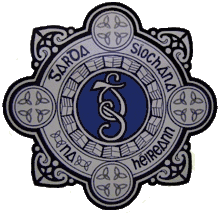National Bureau of Criminal Investigation
| Irish: An Biúró Náisiúnta um Imscrúdú Coiriúil | |
| Agency overview | |
|---|---|
| Formed | 1997 |
| Jurisdiction | Ireland |
| Headquarters |
Harcourt Street, Dublin (D2) 53°20′03.5″N 6°15′50.3″W / 53.334306°N 6.263972°W |
| Employees | Undisclosed |
| Annual budget | Undisclosed (part of Garda Síochána budget, €1.34 billion in 2014) |
| Minister responsible |
|
| Agency executives |
|
| Parent agency |
National Support Services |
| Website | Official website |
.jpg)
The National Bureau of Criminal Investigation (NBCI) (Irish: An Biúró Náisiúnta um Imscrúdú Coiriúil) is the main national criminal investigative branch of the Garda Síochána, the national police force of Ireland. The unit is responsible for the investigation of serious and organized crime nationwide. It was formed in 1997 with the amalgamation of a number of national and specialist investigation units. The Garda NBCI is headed by a Detective Chief Superintendent, who reports to the Assistant Commissioner in charge of National Support Services.[1] The bureau is headquartered at Harcourt Street, Dublin City, and operates throughout the country.[2]
Organisation
The Garda National Bureau of Criminal Investigation consists mainly of detectives, who are generally senior investigators, and is headed by an officer of Detective Chief Superintendent rank. The head of the Garda NBCI reports to the Assistant Commissioner in charge of National Support Services, who reports directly to the Garda Commissioner.[3] The NBCI was established in 1997, centralising other investigative branches around the country, as a response to the proliferation of serious and organised crime.[4] Its main function is to provide a specialist investigative response to serious criminal activity, supporting other Garda units and/or local investigators in their investigation into serious crimes.[5] The NBCI is the main unit within the Gardaí that investigates internal Garda criminality and corruption.[6][7][8]
The NBCI works closely with other Garda units, and law enforcement agencies from other countries when there is an international dimension to investigations, such as the Police Service of Northern Ireland (PSNI), Metropolitan Police Service and National Crime Agency (NCA) in the United Kingdom.[2]
The NBCI operates from the Dublin Metropolitan Region (DMR) Headquarters of the Gardaí in Harcourt St, Dublin 2, and has personnel in all six Garda regions (DMR, Eastern, Northern, Southern, South-Eastern and Western). NBCI officers are mostly experienced detectives, who have been promoted to the unit from other investigative units, and the majority have spent time as local/regional detectives. All officers within the NBCI are armed. The unit receives funding for specialist equipment (such as investigative tools, weapons and vehicles) which other areas of the force does not possess, and therefore more serious crimes and crimes of a sensitive nature are investigated by the NBCI.[2]
The Garda NBCI houses the following sub-units;
Remit
- Murder
- Stolen Motor Vehicles & Plant
- Serious & Organised Crime
- Theft of Computer Components
- Anti-Racketeering
- Arts and Antiques Thefts
- Domestic Violence and Serious Sexual Assault including rape
- Postal and Telegraphy Thefts and Fraud
- Paedophile Investigations
- Intellectual Property Rights Violations
- Review of Major Investigations
The responsibility for the investigation of crime rests with local Garda Superintendents, the NBCI provides expertise and skills in the investigation of serious and organised crime. Bureau staff members assist in all aspects of the investigation including;
- Preliminary enquiries
- Case management
- Incident Room management
- General investigation
- File preparation
Specialist investigation teams from NBCI carry out these tasks when requested by local Garda officers or on the direction of senior Garda Management.[2]
Weapons
Unlike regular uniformed Garda officers – who are unarmed – detectives of the NBCI are plainclothes armed officers. NBCI detectives are more heavily armed and receive a higher standard of firearms training than regular Garda detectives, due to the nature of their work.[11]
NBCI officers are routinely armed with the following;
- SIG Sauer P226 (9×19mm Parabellum semi-automatic pistol)
- Walther P99 (9×19mm Parabellum semi-automatic pistol)
- Heckler & Koch MP7 (HK 4.6×30mm submachine gun)
- Heckler & Koch HK33 (5.56×45mm NATO assault rifle)
- Benelli M3 (Super 90) (12 gauge dual-mode shotgun)
- Steyr SSG 69 (7.62×51mm NATO bolt-action sniper rifle)
See also
References
- ↑ Cusack, Jim (5 February 2012). "Fears over exodus of top gardai". Irish Independent. Retrieved 31 May 2015.
- 1 2 3 4 "National Bureau of Criminal Investigation". garda.ie. Retrieved 2 March 2015.
- ↑ "Garda Commissioner Noirin O'Sullivan orders 93 senior gardai to be moved". The Herald. 27 February 2015. Retrieved 31 May 2015.
- ↑ "Two Garda crime units have no leaders". Irish Examiner. 25 January 2010. Retrieved 31 May 2015.
- ↑ "Crime Investigation Report". Garda Síochána Inspectorate. Archived from the original on 24 September 2015. Retrieved 31 May 2015.
- ↑ "Garda in poison pen letter claim is arrested". The Herald Newspaper. 9 October 2013. Retrieved 31 May 2015.
- ↑ "Probe into allegations of Garda corruption". Irish Examiner. 21 December 2010. Retrieved 31 May 2015.
- ↑ "Squad catches garda with cocaine". Irish Examiner. 2 February 2011. Retrieved 31 May 2015.
- ↑ "Cold case unit to review 150 unsolved crimes". Irish Examiner. 24 September 2007. Retrieved 31 May 2015.
- ↑ "Garda 'cold case' murder unit may be disbanded over disputes". Irish Independent. 8 December 2013. Retrieved 31 May 2015.
- ↑ Cusack, Jim (17 November 2001). "Special Garda unit set up to deal with armed robberies". Irish Independent. Retrieved 31 May 2015.
